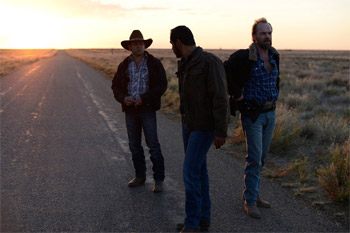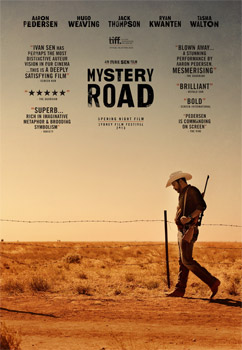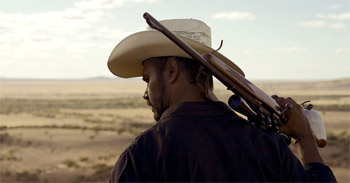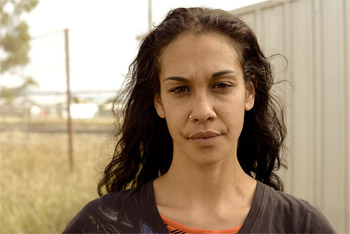Hugo Weaving and Ryan Kwanten Mystery Road

Mystery Road
Cast: Aaron Pedersen, Damian Walshe-Howling, Jack Charles, Hugo Weaving, Jack Thompson, Ryan Kwanten, Tasma Walton, Tony Barry, David Field, Samara Weaving, Robert Mammone, Roy Billing, Zoe Carides, Lillian Crombie and Bruce Spence
Director: Ivan Sen
Rated: M
Running Time: 111 minutes
Synopsis:a brutal crime,
a rookie cop… out of his depth
stands alone between two worlds,
where the mystery lies just below the surface
Mystery Road …
Indigenous cowboy detective Jay Swan returns to his outback home town, to solve the murder of a teenage girl, whose body is found under the highway trucking route out of town. Alienated from both the white dominated police force and his own community, including his teenage daughter, who he discovers is connected with the murdered girl, Jay stands alone in his determination to fight back for his town and his people.
Mystery Road
Release Date: October 17th, 2013
Director's Statement
Mystery Road's seed was sewn in 2006 when I began developing an idea about an Indigenous cop, who was caught in the middle of the police establishment and the Indigenous community. And from that early time I had Aaron Pedersen in mind to play the role. But instead of the outback, the story was set in the inner city of Sydney. I remember bumping into Aaron one night and I mentioned the idea to him. But after that moment, I went onto a different project and it got pushed aside until I picked it up again in late 2011.
 I've always been interested in the fringes of cultures, and especially drawn to the historical role of the "Turncoat". In Australia he was the Indigenous Black Tracker or the Native Policeman, and in America was known as the Native American Scout. He was a man employed to track, disperse, and even slaughter his fellow people.
I've always been interested in the fringes of cultures, and especially drawn to the historical role of the "Turncoat". In Australia he was the Indigenous Black Tracker or the Native Policeman, and in America was known as the Native American Scout. He was a man employed to track, disperse, and even slaughter his fellow people.Even though they were often engaged in areas of opposing tribal groups, the internal pressures of such an occupation must have been hard to comprehend, at times possibly being the ultimate identity crisis. This struggle of cultural identity is something I personally dealt with while growing up in a small country town, and have continued to explore it through Mystery Road.
Jay Swan is not just a modern day Turncoat. He is an empowered Detective, but the power still remains with the establishment, through his colleagues and superior. Unlike many of the past Native Police, Jay is not a stranger to the town in Mystery Road, although he sometimes feels that way.
Jay Swan makes Mystery Road more than just a mystery thriller. He provides a fresh and thought provoking perspective that is a struggle at every turn, and on many levels. He has moved out of the local public housing estate, and found himself a big house on the other side of town. But it has come at a cost. He has lost touch with his exEwife, his teenage daughter, and the community, which he is trying to make a better place. But perhaps only Jay believes it can be a better place. He is a loner, an archetypal cowboy, and a victim of his own wishful thinking.
There's a lot of thematic detail in Mystery Road, which I find difficult to articulate outside of the film. The film is full of my childhood and adulthood experiences. From the murdered young girl found under the highway, to the gunplay of the cowboys. The elements are largely drawn from my own country life experience. A few years ago, a distant cousin of my mother was found dead under a roadway in northern NSW. She had been stripped and brutally murdered. The police have seemingly done very little to bring her killer to justice and this has brought resentment from the local Indigenous community. I have also wanted a chance to express the gun culture from my childhood. In the country, people rarely go into nature purely for the nature experience. There's usually always a reason for it. I grew up surrounded by a hunting culture. Although I didn't enjoy the kill, the most enjoyable part was the chance to connect with nature, to see and feel something beautiful, outside the harshness of the town.
Mystery Road is essentially a Murder Mystery thriller. It's a genre which doesn't get used so much these days in the cinema, though it is commonplace on television in many different forms. The challenge was to make it cinematic in every filmic detail. We were incredibly blessed to have the involvement of many of Australia's finest and most talent actors. All of whom came on board with a love for a project they felt very strongly about. All of the actors were incredibly generous and supportive, as was every single crew member, for that matter. I involved Aaron Pedersen from the scripting stage, and that was the early beginning of our journey together.
In early preEproduction, the two of us travelled together on a location scout to Moree and then to outback Queensland. Aaron got a chance to see where his character came from, and to feel the dirt under his feet. It was a very important part of our preparation, and something an actor rarely gets to do. We agreed we were both in this thing together, and we couldn't do it without each other. We both believed strongly in the story and felt like our ancestors were watching over us as we made this film. So there was a very strong bond between the film, and us and that bond would get us through any of the more difficult parts of the shoot later on.
From the writing stage, I wanted Mystery Road to have a timeless, classical feel. A feel that was reminiscent of Hollywood films of the 60s and 70s which were more dialogue based and relied little on music and trickery. I wanted this film to have a quiet, almost trance like atmosphere, where the music became the words spoken from the characters. In conversations with Aaron Pedersen, we constantly used the word precision. We were conscious that we weren't experimenting with this project. We wanted to be very precise in every aspect of making this film. I have made several experimental films over the last few years. This time it was about finding intricate beauty in every frame, every camera move being for the right reason, every word to be clear and convincing. I wanted to put the audience into the driver's seat, and allow them to enjoy every second of the ride. Mystery Road is a Murder Mystery film, but it is one with undercurrents, which can swirl around the feet of the audience, and enhance the generic experience.
Mystery Road Production Background
Ivan Sen's body of work marks him as one of the preEeminent voices in Australian cinema. His award winning films, such as Beneath Clouds and Toomelah, each with a powerful personal vision, have played at Berlin, Sundance and Cannes. He is, above all, a director, but also shoots, composes and edits his film.
Mystery Road marks a departure for Ivan and recent Australian films by other Indigenous filmmakers. It is boldly a genre film – a Murder Mystery, in the style of a Western, set in the magnificent landscape around Winton, outback Queensland.
Beyond the suspense and mystery, it also tells the personal emotional journey of Aboriginal Detective Jay Swan, as he grapples with what action he must take in order to decide the future of his town and his community.
Mystery Road offers a stunning cinematic vision as it follows the story of Detective Swan, played by Aaron Pedersen, assigned to his first case after his return to his hometown. Jay must investigate the brutal murder of a young Aboriginal teenager, whose body is found in a drainpipe with her throat cut.
'
We consciously sat down together – me, the producers, the actors E and talked what we were going to do with this film," Ivan says. 'We weren't trying to experiment. We were clear we wanted to do a very precise, thoughtEprovoking Murder Mystery film." Aaron Pedersen says: 'When the body of a young Aboriginal girl turns up, a story of mystery and intrigue, of politics and family, begins to unfold."
Jay Swan follows the trail throughout the town and it's outskirts, which eventually leads him to the awful truth.
'It's a story about a man protecting his community… it's about him standing up for his community," Aaron says, 'Jay takes it on, and he accepts that responsibility."
Jay was a character created by Ivan Sen especially for Aaron Pedersen. Ivan first approached Aaron about making a film together more than eight years ago. His initial idea was to have Aaron play a cityEbased detective negotiating the attitudes of the predominantly white police force while trying to solve a murder.
But the idea evolved into a story about young girls in a country town, inspired by the unsolved murder of one of Ivan's teenage relatives, a distant cousin.
The film is set in a town evocative of Moree, in the outback, where Ivan spent much of his youth.
'This kind of town has lots of untapped stories. They are a melting pot because you've got Indigenous people from different areas all coming together into a community, mixing with the local white people as well as the local Indigenous people. So you've got all kinds of conflicts coming out of that," Ivan says.
'And then, in Moree, you've got the highway which runs through the town and plays a major role in the life of the town, including in drug distribution and prostitution. A town like this is big enough for people to hide and to get away with things you couldn't get away with in a smaller town. These towns are also very territorial. You get a series of microEcommunities where people might not leave a particular street or area for days. So people don't necessary know what's going on the other side of town."
It's this landmine of conflict and secrets that Detective Jay Swan must navigate in Mystery Road, along with the racism experienced by Aboriginal Australians and contempt of his own community towards the police.
'As Jack Thompson said to me, racism isn't confined to country towns in Australia, it's in the city too. And it is definitely inherent in the script because you have an Indigenous detective dealing with a white police force. It' not something I really highlighted, it's just something that's part of the subtext of this world, part of the dayEtoEday struggle of someone like Jay who works in a white bureaucracy," Ivan says.
'The black tracker is someone I've always been intrigued by and I guess I've always had a feeling for what they went through because I've always had to deal with the white world and the Aboriginal world together.
'As an Aboriginal detective, Jay is today's equivalent of the black tracker and it is such a conflicted role. You have to work within a white world and also a black world, but you're a kind of enemy to both. Everyone wants you to be on their side, but the reality is that someone like Jay is forever stuck in the middle."
In returning to the town as a Detective, this is a burden Jay fully comprehends. We see him as an outsider – living alone, separate from his police colleagues at a convivial dinner and viewed with suspicion by the Aboriginal community.
He's also a larger than life persona, with the filmmakers developing the iconography of a classic Western to flesh out the character of Jay and to bring a particular visual style to the film, as evidenced in wardrobe, location and production design.
'Mystery Road is a Cowboy Western film, and that evolved through determining the look and the attitude of the lead character," says Jowsey. 'Aaron was always going to be the lead in the film… and Ivan wanted Aaron looking like a cowboy. He wears a cowboy hat, he slings a pistol and he's wearing cowboy boots. Once that was established the film itself became a Western."

Mystery Road was shot in the small country town Winton, which is almost 1500km inland in western Queensland, and has a population of less than 1000. Winton is famous for being the town where Australia's most famous song, Waltzing Matilda, was written by Australia's most famous early poet, Banjo Patterson.
The landscape surrounding the town is extraordinary E bold and diverse.
'We went to Winton because of the beautiful landscape. From a purely aesthetic point of view, it is a place that has a lot of contrast in the scenery," Ivan says. 'There are mountains, sand dunes and very flat fields, and you also don't have to go very far to travel from wide expanses with no trees, to mountains covered in trees, to towering blood red cliffs."
True Blood star Ryan Kwanten travelled home to Australia to take on the role of the roo shooter Pete.
'It was my first time out in that part of the country," says Ryan Kwanten. 'I don't know what it was, but I felt very much at home there. I had a climb around the landscape and got in touch with the land. I felt a very strong affinity towards it."
Ryan is part of a commanding cast that combines local Indigenous talent and a 'who's who of Australian acting." The allEstar line up also boasts such names as Hugo Weaving, Jack Thompson, Tony Barry, Tasma Walton, Damian WalsheEHowling, Robert Mammone and Samara Weaving.
'I think once word got out that the script was good, there was a real sense that people wanted to come and support Ivan," producer David Jowsey says. 'It's absolutely lovely that major actors in Australia came out of their way, literally into the middle of the outback, to support our film."
'We're all part of the Australian film industry, we're all part of the Australian film making community," says Jack Thompson, 'but what I really feel, is that we all want to be a part of this film."
Mystery Road
Release Date: October 17th, 2013
MORE






